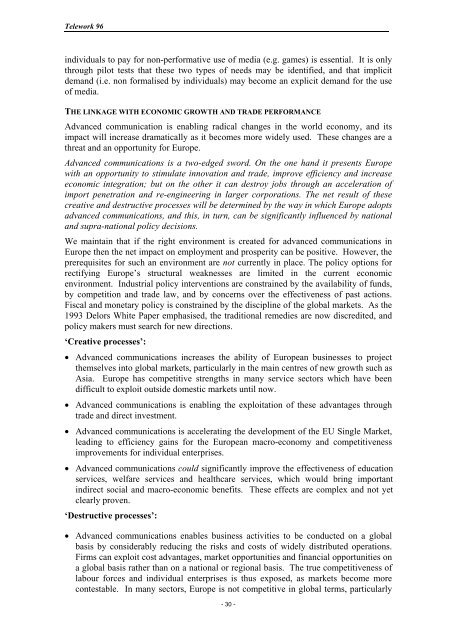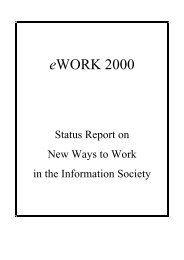1996 - European Telework Week
1996 - European Telework Week
1996 - European Telework Week
- No tags were found...
Create successful ePaper yourself
Turn your PDF publications into a flip-book with our unique Google optimized e-Paper software.
<strong>Telework</strong> 96<br />
individuals to pay for non-performative use of media (e.g. games) is essential. It is only<br />
through pilot tests that these two types of needs may be identified, and that implicit<br />
demand (i.e. non formalised by individuals) may become an explicit demand for the use<br />
of media.<br />
THE LINKAGE WITH ECONOMIC GROWTH AND TRADE PERFORMANCE<br />
Advanced communication is enabling radical changes in the world economy, and its<br />
impact will increase dramatically as it becomes more widely used. These changes are a<br />
threat and an opportunity for Europe.<br />
Advanced communications is a two-edged sword. On the one hand it presents Europe<br />
with an opportunity to stimulate innovation and trade, improve efficiency and increase<br />
economic integration; but on the other it can destroy jobs through an acceleration of<br />
import penetration and re-engineering in larger corporations. The net result of these<br />
creative and destructive processes will be determined by the way in which Europe adopts<br />
advanced communications, and this, in turn, can be significantly influenced by national<br />
and supra-national policy decisions.<br />
We maintain that if the right environment is created for advanced communications in<br />
Europe then the net impact on employment and prosperity can be positive. However, the<br />
prerequisites for such an environment are not currently in place. The policy options for<br />
rectifying Europe’s structural weaknesses are limited in the current economic<br />
environment. Industrial policy interventions are constrained by the availability of funds,<br />
by competition and trade law, and by concerns over the effectiveness of past actions.<br />
Fiscal and monetary policy is constrained by the discipline of the global markets. As the<br />
1993 Delors White Paper emphasised, the traditional remedies are now discredited, and<br />
policy makers must search for new directions.<br />
‘Creative processes’:<br />
• Advanced communications increases the ability of <strong>European</strong> businesses to project<br />
themselves into global markets, particularly in the main centres of new growth such as<br />
Asia. Europe has competitive strengths in many service sectors which have been<br />
difficult to exploit outside domestic markets until now.<br />
• Advanced communications is enabling the exploitation of these advantages through<br />
trade and direct investment.<br />
• Advanced communications is accelerating the development of the EU Single Market,<br />
leading to efficiency gains for the <strong>European</strong> macro-economy and competitiveness<br />
improvements for individual enterprises.<br />
• Advanced communications could significantly improve the effectiveness of education<br />
services, welfare services and healthcare services, which would bring important<br />
indirect social and macro-economic benefits. These effects are complex and not yet<br />
clearly proven.<br />
‘Destructive processes’:<br />
• Advanced communications enables business activities to be conducted on a global<br />
basis by considerably reducing the risks and costs of widely distributed operations.<br />
Firms can exploit cost advantages, market opportunities and financial opportunities on<br />
a global basis rather than on a national or regional basis. The true competitiveness of<br />
labour forces and individual enterprises is thus exposed, as markets become more<br />
contestable. In many sectors, Europe is not competitive in global terms, particularly<br />
- 30 -








